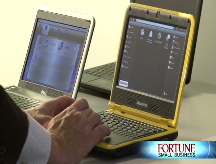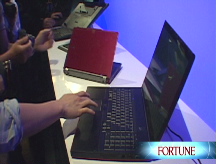Tech's hope in 2009 - or curse?
Tech Daily: Sales of under-$400 computers are expected to soar in the coming year - much to the delight of one tech giant and the dismay of just about everyone else.
 |
| Intel is betting that its new Atom chip, which powers computers like the Asus EEE (above), will dominate low-cost laptops. |
SAN FRANCISCO (Fortune) -- This Christmas, the titans of the personal-computer industry are finding big lumps of coal in their stockings, and a few are grumbling that it's Intel's fault.
Of course, it's been a bad holiday season for just about everyone - the National Retail Federation expects the weakest holiday sales gains in six years - but it's particularly bad for computers.
Not only has the U.S. economy tumbled into a deep recession, but the rest of the world has fallen in too, ruining the tech industry's overseas growth story. If U.S. consumers are hesitant to drop a few hundred dollars on a new PC, how do you think buyers in developing economies like Brazil are feeling?
There is one relatively bright spot in this gloomy retail season: the "netbook," a device resembling a laptop that's been shot with one of those cartoon miniaturization guns.
The typical netbook weighs 3 pounds, has a 9-inch screen, offers a wireless Internet connection, runs Microsoft (MSFT, Fortune 500) Windows XP and has an Intel chip inside. Oh, and it costs less than $400.
I know what you're thinking. A laptop for less than $400? What's wrong with that? If you're Intel (INTC, Fortune 500), not much.
Intel is the company that probably has the most to gain since the most popular netbooks carry Intel's new Atom chip. Atom is smaller, cheaper to produce, and more power-efficient than Intel's mainstream fare, making it an ideal cornerstone for a low-cost laptop.
With this in mind, Intel encouraged the emergence of the netbook segment by selling Atom chips to upstart companies like Acer and ASUS, and allowing the resulting netbooks to be sold in tech-savvy markets in Europe and North America. (Originally, Intel planned to target poorer countries.)
Is Intel worried about cannibalizing sales of higher-end laptops? Not really. Intel executives say that, if anything, Atom-based netbooks seem to be luring buyers who otherwise would have bought laptops with low-cost chips from rival Advanced Micro Devices (AMD, Fortune 500).
But Intel customers like Hewlett-Packard (HPQ, Fortune 500) and Dell (DELL, Fortune 500) aren't so thrilled. Unlike the Taiwanese companies that are embracing netbooks, HP and Dell are frustrated with the low margins at the low end of the business, and are focused on creating clever designs and software that entice consumers to pay more - a strategy that Apple has successfully executed in the past.
"There's no money to be made at $400," one marketing executive said recently. "Consumers might be hungry for a deal, but these are not great machines."
To the big-name brands, bare-bones Atom-based netbooks are a plague. They may be popular, but they are pushing industry heavyweights toward a price war, something they've worked hard to avoid for the last few years.
Silicon Valley executives privately talk about PC price wars as a race to the bottom, where companies vie to put out the cheapest, barely functional product while managing not to lose money. As one CEO described it: "It's like a crap-eating contest. Who wins: the one who eats the most, or the one who eats the least?"
For now, the big names are trying to eat the least. Apple (AAPL, Fortune 500) is staying away from netbooks entirely; CEO Steve Jobs has said he's unwilling to compromise quality to satisfy the bargain bin.
Todd Bradley, the chief of Hewlett-Packard's PC division, has said he's only interested in profitable growth; rather than push bare-bones netbooks, his team is trying to fast-track a premium model developed with input from designer Vivienne Tam.
Dell is selling its Inspiron Mini 9 netbook direct only, a venue that maximizes profits.
Will that work? The latest numbers released by research firm IDC show peronal-computer unit sales up but revenues down - a sign of the netbook effect. If that continues, PC makers will be tempted to bring bigger appetites to the crap-eating contest. ![]()
-
 The retail giant tops the Fortune 500 for the second year in a row. Who else made the list? More
The retail giant tops the Fortune 500 for the second year in a row. Who else made the list? More -
 This group of companies is all about social networking to connect with their customers. More
This group of companies is all about social networking to connect with their customers. More -
 The fight over the cholesterol medication is keeping a generic version from hitting the market. More
The fight over the cholesterol medication is keeping a generic version from hitting the market. More -
 Bin Laden may be dead, but the terrorist group he led doesn't need his money. More
Bin Laden may be dead, but the terrorist group he led doesn't need his money. More -
 U.S. real estate might be a mess, but in other parts of the world, home prices are jumping. More
U.S. real estate might be a mess, but in other parts of the world, home prices are jumping. More -
 Libya's output is a fraction of global production, but it's crucial to the nation's economy. More
Libya's output is a fraction of global production, but it's crucial to the nation's economy. More -
 Once rates start to rise, things could get ugly fast for our neighbors to the north. More
Once rates start to rise, things could get ugly fast for our neighbors to the north. More












